Politics
Political scrapper set on ‘governing right’

 Getty Images
Getty ImagesLike her political heroine Margaret Thatcher, Kemi Badenoch divides opinion even within her own party.
Her robust views, “anti-woke” values and no-nonsense style have made her a darling of the Conservative right and the party’s grassroots, many of whom see her as a star in the making.
Others point to what they regard as her combative nature and a tendency to generate controversy.
The former business secretary’s analysis of what went wrong for the Conservatives at the general election is that they “talked right, but governed left”, and need to “stop acting like Labour” to win back power.
It is a pledge she has put at the heart of her Tory leadership campaign, which has focused on changing the underlying mindset of the British state.
Born in Wimbledon in 1980, Olukemi Adegoke was one of three children of Nigerian parents. Her father worked as a GP and her mother was a physiology professor.
Badenoch – she married banker Hamish Badenoch in 2012 and they have three children – grew up in Lagos, Nigeria, and in the United States where her mother lectured.
She returned to the UK at the age of 16 to live with a friend of her mother because of the worsening political and economic situation in Nigeria, and studied for her A-levels at a college in south London while working in a McDonald’s restaurant and elsewhere.
After completing a degree in computer engineering at Sussex University, she worked in IT while also gaining a second degree in law.
She then moved into finance, becoming an associate director of private bank Coutts and later worked as the digital director of influential Conservative-supporting magazine The Spectator, a non-editorial role.
According to Blue Ambition, a biography written by Conservative peer Lord Ashcroft, it was at Sussex University that Badenoch got a taste for right-wing politics – becoming “radicalised” by the left-wing campus culture, in the opposite direction.
She later described student activists there as the “spoiled, entitled, privileged metropolitan elite-in-training”.
Badenoch joined the Conservative Party in 2005 – aged 25 – and stood unsuccessfully for Parliament in 2010 and the London Assembly in 2012.
When two Tory Assembly members, including Suella Braverman, were elected MPs in 2015, she took a vacant Assembly seat.
She backed Brexit in the 2016 referendum before achieving her ambition of becoming an MP a year later, for the safe Conservative seat of Saffron Walden in Essex.
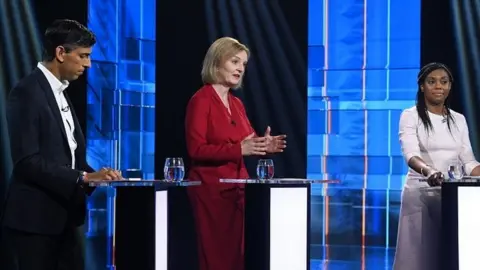 EPA
EPABadenoch had spent three years bouncing around junior government roles when in 2022 she joined the rapid ministerial exodus which brought down Boris Johnson.
To the surprise of many of her colleagues, Badenoch then joined the sprawling contest to succeed Johnson despite never having been in the cabinet.
What began as a longshot campaign with the support mostly of loyal friends who also entered Parliament in 2017 quickly gained momentum, and heavyweight support in the form of Michael Gove.
Badenoch ultimately came fourth with the backing of 59 MPs – more than the 42 MPs who were enough for her to finish top in the parliamentary stage of the current leadership election.
Her direct approach, instructing her colleagues to “tell the truth”, won Badenoch a bigger role in the Conservative Party and it was inevitable that Liz Truss chose to appoint her to the cabinet – making her international trade secretary.
Rishi Sunak retained her in post, adding the business and women and equalities briefs.
Her time in Parliament has been characterised by her straightforwardness and willingness to engage in controversial issues.
As a junior equalities minister under Johnson, she enraged many on the left when she challenged the notion there was widespread institutional racism in Britain.
In an LBC interview, she said she had experienced prejudice only from left-wingers.
“I came to this country aged 16 and now I am standing for prime minister – isn’t that amazing? I was born in this country but I didn’t grow up here.
“I don’t understand why people want to ignore all of the good things and only focus on the bad things, and use the bad things to tell the story,” she added.
She calls herself a gender-critical feminist, and has been an outspoken opponent of moves to allow self-certification of transgender identity.
As the cabinet minister in charge of women and equalities, she spearheaded the UK government’s blocking of Scotland’s Gender Recognition Reform Bill.
Responding to the Cass report on gender identity services in the NHS, she said they had been “hijacked by ideologues” while critics were “gagged”, resulting in children being harmed.
She has also opposed gender-neutral toilets.
In 2021, members of the government’s own LGBT+ advisory panel urged her to “consider her position” over the failure to deliver a manifesto pledge to ban so-called conversion therapy.
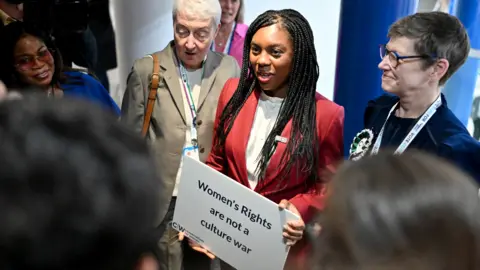 Getty Images
Getty ImagesBadenoch is often labelled a “culture warrior” but she disputes the tag.
Sometimes accused of wanting to start a fight in an empty room, she says she does not like to fight – but is prepared to fight to defend Conservative principles.
That is simultaneously what endears her to Conservative MPs and what makes some of them anxious.
During the early stages of the leadership election several Conservative MPs told the BBC they were inclined to support Badenoch but were put off by fractious interactions while she was in government.
To her supporters, that’s the point: unlike other ministers she was willing to tell MPs what she believed and make the case for it forthrightly.
On the eve of this year’s party conference in Birmingham, she made headlines with a claim that not all cultures were “equally valid”, citing as an example “cultures where women are told that they should not work”.
She also got attention in Birmingham for quipping that 5-10% of civil servants were so bad they should be in prison. She has previously strongly denied bullying officials.
But she backtracked after an interview in which she appeared to suggest the current level of maternity pay was “excessive”. She claimed her words had been “misrepresented”, saying she had been talking about excessive business regulation and maternity pay was “a good thing”.
In 2018, Badenoch admitted that, a decade earlier, she had hacked into the website of then-Commons leader and deputy Labour leader Harriet Harman as a prank. Harman accepted her apology.
Among public spats, in February, she accused the Post Office chair she had sacked of seeking “revenge” by “making up” claims he been told to delay compensation payments for sub-postmasters affected by the Horizon IT scandal.
Henry Staunton said he had been told to stall pay-outs to allow the government to “limp into the election”, apparently to ease the public finances.
Conservatism ‘in crisis’
Nor has Badenoch shied away from public clashes with MPs on her own side – including when she rejected calls to make it illegal to discriminate against people going through the menopause.
Appearing before a Commons committee, she told chair Caroline Nokes “loads of people” wanted to use equalities law as “a tool for different personal agendas and interests”.
During her leadership campaign, Badenoch has spoken of Conservatism being “in crisis” – under attack from a new “progressive ideology” involving “identity politics” (politics based on a particular identity such as race, religion or gender), constant state intervention, and “the idea that bureaucrats make better decisions than individuals” or elected politicians.
Despite the Tories being in office for 14 years, she argues that increases in government regulations and public spending have crippled economic growth and polarised the country.
She has rejected Robert Jenrick’s call for key party policies to be settled now, saying the UK’s “system is broken” and requires a reset.
The Conservative Party, she adds, needs to return to its core values and come up with new policies that recognise this reality.
Politics
Reeves considers income tax threshold freeze
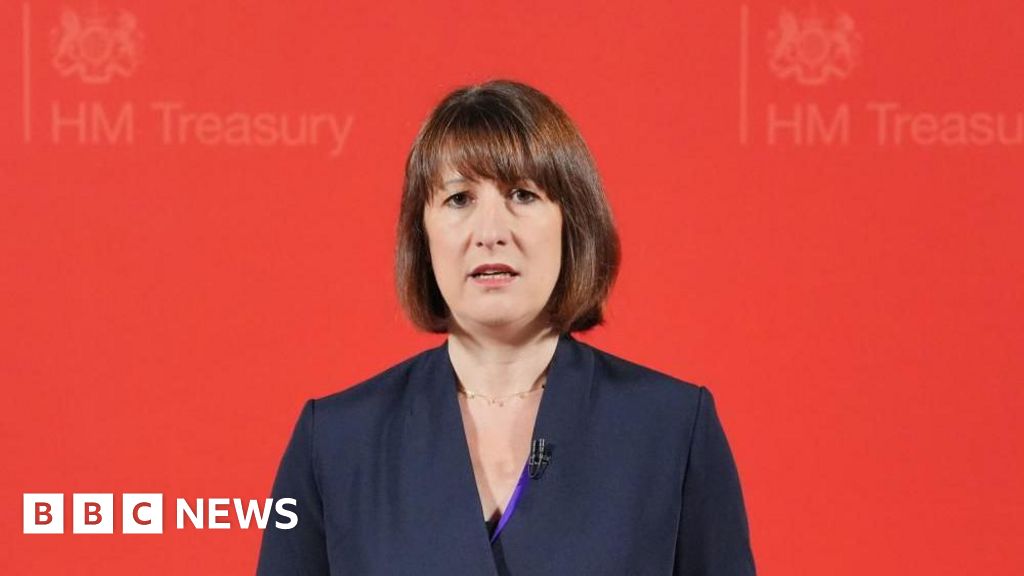
An announcement in the upcoming budget of a continued freeze on income tax thresholds beyond 2028 would not constitute a breach of Labour’s election manifesto promise, government sources have insisted.
In the run-up to June’s general election, both leader Sir Keir Starmer and the soon-to-be Chancellor Rachel Reeves pledged to “not increase taxes on working people”.
But a threshold freeze could allow the chancellor to raise an estimated £7bn by bringing more people into the tax system.
Reeves is currently trying to find £40bn through a mixture of savings and tax rises that she will announce in the new government’s first budget on Wednesday 30 October.
Tax thresholds were frozen by the previous Conservative government in 2022, but were due to rise again each year from 2028.
The chancellor is now said to be weighing a plan to extend the freeze for the remainder of the parliament.
The decision not to increase tax thresholds would continue a process called “fiscal drag”, in which more people are “dragged” into paying tax, or higher rates of tax, as their wages rise and cross the unchanging thresholds.
If Reeves goes ahead with the plan, roughly 400,000 more people will find themselves paying income tax at the basic rate.
Government insiders have insisted this does not breach Labour’s manifesto pledge to “not increase taxes on working people”.
Sources are pointing to the exact wording of the manifesto, which states that the “rates” of income tax would not rise.
In other words, in England, Wales and Northern Ireland these would remain – depending on income – at 20p, 40p and 45p.
But as people’s wages increased, so too would their tax bill.
In 2019, the Conservatives also pledged not to increase tax “rates” – and went on to freeze tax thresholds.
At the time, this was denounced by the Labour opposition as a “stealth tax”.
However, it is not one the party has specifically pledged to reverse.
Labour’s opponents will argue that an extension of a freeze would undermine the party’s wider-ranging promise not to increase taxes on working people.
Reeves has just 11 days to firm up her plans ahead of Budget day.
The country’s first female chancellor has warned of a £22bn “black hole” in the public finances – a gap caused by the rules the government has chosen to follow governing how much money it can borrow over the next five years.
Filling this hole would only be enough to “keep public services standing still”, the chancellor said this week.
This means she is hoping to find £40bn in order to avoid real-terms cuts to government departments.
Reeves has warned of “difficult decisions” ahead.
Politics
Senior Unite union official loses unfair dismissal claim

 BBC
BBCA senior official at one of the UK’s largest trade unions has lost an unfair dismissal claim amid a police investigation into allegations of bribery, fraud and money-laundering at the organisation.
Howard Beckett was assistant general secretary at Unite the Union until his suspension in August 2022, four months after police raided the union’s London headquarters.
In his tribunal judgement, employment judge Richard Nicolle said police searches had also taken place at Mr Beckett’s “flat in London and home on the Wirral on 6 April 2022”.
Mr Beckett argued the claims against him were “baseless”.
His lawyer has told the BBC he is appealing the Employment Tribunal’s judgement, has launched legal action against the union and its general secretary for breach of privacy, and he noted the judge had been critical of Unite.
Mr Beckett was initially told his suspension was due to allegations of “misleading” the union’s ruling executive council in relation to the construction of its vastly over-budget hotel and conference centre in Birmingham.
The project was originally estimated to cost £7m but more than £100m was eventually spent.
An independent valuation later concluded the finished building was worth only £29m.
General secretary Sharon Graham commissioned an inquiry which, the tribunal said, led to the discovery of £14m which did not feature “in the final accounts and it remaining a mystery as to how and when this figure had been assessed and then presumably paid” to a contractor.
Mr Beckett was also told he had been suspended due to “concerns about the probity of awarding contracts for affiliated services”.
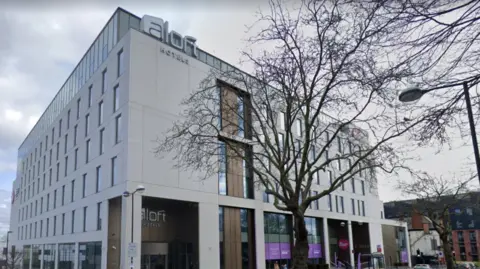 Google
GoogleA close ally of former Labour leader Jeremy Corbyn, Mr Beckett was off sick for almost 18 months before he resigned from Unite in January 2023.
His lawyer told the tribunal Mr Beckett had not been well enough to participate in a disciplinary hearing and the union’s disciplinary charges were “baseless”.
The employment judge rejected this, and also found Mr Beckett had not been demoted as he had claimed.
The judge did, however, say there were “significant deficiencies” in Unite’s “investigation and disciplinary processes”.
Judge Nicolle wrote: “It would have been extremely surprising in the Tribunal’s view had [Unite] allowed its Head of Legal to return to active employment in circumstances where there were ongoing police investigations into very serious matters to include bribery, money laundering and offences under proceeds of criminality legislation.”
Ms Graham, who succeeded Len McCluskey as Unite general secretary in 2021, did not give evidence to the tribunal.
The BBC has contacted Unite the Union for comment.
Politics
Labour tiptoes nervously towards a China policy

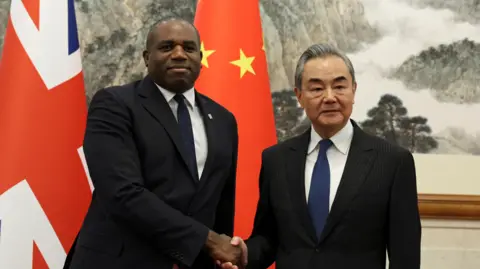 Reuters
ReutersLabour declared after the election that “Britain is back” on the world stage after years of Conservative retreat.
But when it comes to China, the government is tiptoeing nervously in the wings.
David Lammy’s trip to China is rare – he is only the second foreign secretary to visit in six years.
He held talks in Beijing with his powerful counterpart, Wang Yi, and Vice Premier Ding Xuexiang, before heading to Shanghai to meet British business leaders on Saturday.
You might think the Foreign Office would want to make a big thing of it, to emphasise the importance of the diplomatic repair job the foreign secretary is bent on.
But instead, the trip is taking place sotto voce.
There is little media access to Mr Lammy. There are no announcements about a new trade agreement, or cooperation on policy.
Whitehall sources tell me this in part the fault of Downing Street which, they say, is increasingly gripped by caution after a febrile few weeks.
No10 officials want to avoid political rows ahead of the Budget later this month. They do not want Labour and Conservative MPs to unite in accusing the government of putting economic gain ahead of human rights and international law.
There is a strong cross-party caucus in Westminster that is China-sceptic; seven MPs and peers remain officially sanctioned by Beijing as a result.
They are already accusing Mr Lammy of backtracking on pre-election promises to push the international courts to declare China’s treatment of the Uighur minority as genocide.
China audit looms
Perhaps the chief reason for the low-key nature of Mr Lammy’s visit is that Labour is still working out its policy towards China.
It is conducting what it calls a cross-Whitehall “audit” of Britain’s relationship with the country, which is not due to complete until next year. It is then that Chancellor Rachel Reeves, and perhaps even Prime Minister Sir Keir Starmer, may visit China.
For now, the government has a holding position which it sums up in three words: “challenge, compete, cooperate”.
It says it will challenge China on human rights abuses and its support for Russia in Ukraine. It will compete with China over trade. And it will cooperate with China over shared interests, such as global health and climate change.
If this sounds familiar, that is because other western powers use similar language. And the previous Conservative government’s policy was to “protect, align and engage”.
However, both parties have found it difficult to work out where precisely to draw the line.
Does “compete” involve banning Chinese electric vehicles from the UK’s automotive market?
Does “challenge” mean restricting lucrative Chinese students from attending cash-strapped UK universities?
Does “cooperate” involve sharing private medical research to help prevent a future pandemic?
‘New starting point’
The head of MI5, Ken McCallum, spoke only last week of “a threat that manifests at scale” from China, targeting Britain’s information and democracy.
Mr Lammy’s more prosaic aim on this visit is simply to re-establish some kind of working relationship with Beijing.
Under the Conservatives, UK-China relations blew hot and cold, between the diplomatic warmth of the so-called “golden era” to the hawkish aggression of more recent Conservative leaders.
Last year, then-Prime Minister Rishi Sunak called China the “greatest threat” to Britain’s economy; then-Foreign Secretary James Cleverly visited Beijing calling for re-engagement; his successor Lord Cameron resolutely ignored the country.
Mr Lammy says he wants to re-establish what he calls a more consistent and pragmatic relationship.
During his talks with Mr Wang, he said he was “struck by the scope for mutually beneficial cooperation on the climate, on energy and nature, of the science and tech, on trade and investment, on health and development.”
He said Beijing and London should “find pragmatic solutions to complex challenges”.
China appears up for that. Mr Wang said China-UK relations were “standing at a new starting point” and spoke of “our boosted confidence in bilateral cooperation”.
He even referred by name to Mr Lammy’s foreign policy slogan – “progressive realism” – which Mr Wang said, “has positive significance”.
So far, so conciliatory.
Drawing the line
Of course, Mr Lammy said both countries had “different perspectives” on some issues.
In a statement after the talks, the Foreign Office said he raised concerns about China’s military support for Russia in Ukraine, and how that was damaging China’s relationships in Europe.
The department also said he raised China’s treatment of the Uighurs in the Xinjiang region, “serious concerns” over the implementation of new national security laws in Hong Kong, and called for the release of the British media tycoon Jimmy Lai, who has been arbitrarily detained there.
But it insisted the meeting was “constructive across the full breadth of the bilateral relationship” and both sides committed to “regular discussions” at ministerial level.
For that ultimately is what this trip is all about: re-establishing links with the Chinese government.
The government’s priority is economic growth, and that is hard without a working relationship with its fourth largest trading partner.
But when it comes to China, it still remains unclear where Labour will draw the line between challenging, competing and cooperating.
Politics
No UK apology over slavery at Commonwealth
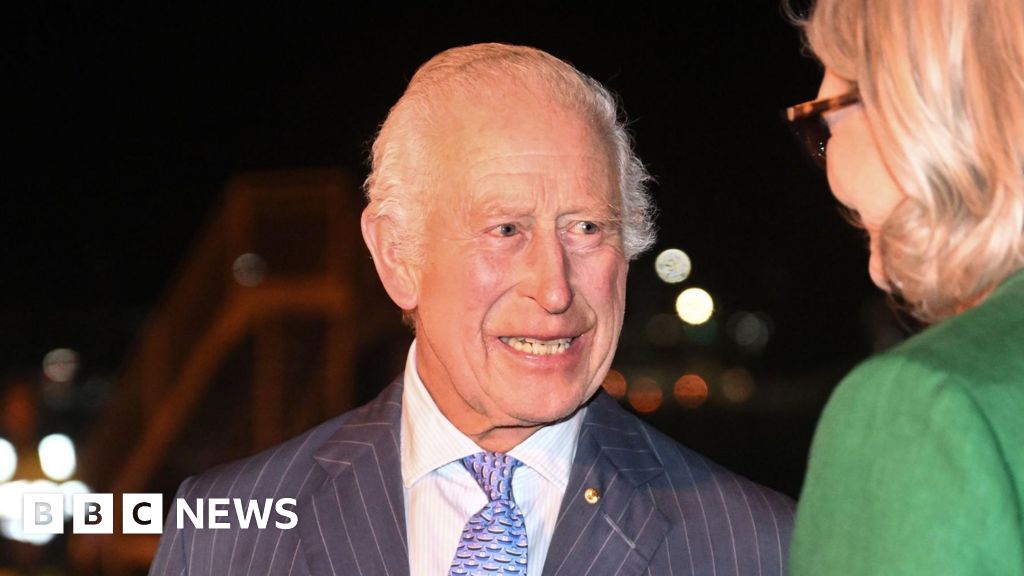
The government has said there will not be an apology over Britain’s role in the transatlantic slave trade when King Charles and Sir Keir Starmer visit the Commonwealth summit in Samoa next week.
A Downing Street spokesperson had already ruled out financial reparations.
Last year, the King spoke of his “greatest sorrow and regret” at the “wrongdoings” of the colonial era on a visit to Kenya, but stopped short of an apology, which would have depended on the agreement of ministers.
The Commonwealth Heads of Government Meeting, to be held in Samoa on 25 and 26 October, will bring together the leaders of 56 countries.
But even if the issue of historic links to slavery is raised at the summit, the UK government has told the BBC there are no plans for a symbolic apology.
Instead the focus will be on current issues, a government spokesperson said, such as “shared challenges and opportunities faced by the Commonwealth, including driving growth across our economies”.
Speeches from monarchs are made on the advice of ministers. This means the King would be unable to make an apology over the UK’s links to slavery unless he had the approval of the government.
Labour MPs including Bell Ribeiro-Addy had called for the UK government to officially apologise for its participation in the slave trade.
David Lammy, as an MP on the opposition benches in 2018, had said: “As Caribbean people we are not going to forget our history. We don’t just want to hear an apology, we want reparations.”
But with Labour now in power, Downing Street has ruled out an apology over slavery and ended speculation of any statement at the Commonwealth meeting in Samoa, which would have been the first international platform for such an apology to take place.
It means that the policy of not apologising continues from the previous government, when prime minister Rishi Sunak last year rejected the idea and said “trying to unpick our history is not the right way forward”.
Opponents of an apology have pointed to Britain’s prominent role in ending slavery, including legislation in 1807 to abolish the slave trade.
Discussions of formal apologies or reparations could still be raised by other countries, with Caribbean leaders having argued for some financial recognition of the legacy of slavery, with figures of £200bn being quoted.
The Commonwealth summit will also vote on a new secretary-general and all three of the candidates are supporters of reparations for transatlantic slavery.
It is an issue which strongly divides the public, including readers of the BBC’s Royal Watch newsletter, who got in touch by email.
“Those of us living now should not be made to feel guilty or apologise for something that had absolutely nothing to do with us,” Ruth, from the UK, said.
“We don’t like what happened, but we weren’t around then, so why should we say sorry?”
Ronald, from Bristol in the UK, took the opposite view.
“A sincere apology would acknowledge that grievance and, in my view, would go some way to assuaging the sense of injustice,” he said.
Sarah, in Ghana, said it would be “humane” of the King to deliver an apology.
“I believe it will go a long way to healing wounds caused by the slave trade,” she said.
The King and Queen Camilla arrived in Australia on Friday to begin their six-day tour of the country, which will be followed next week by the Commonwealth summit in Samoa.
Politics
Labour says it will cut benefits bill in its own way
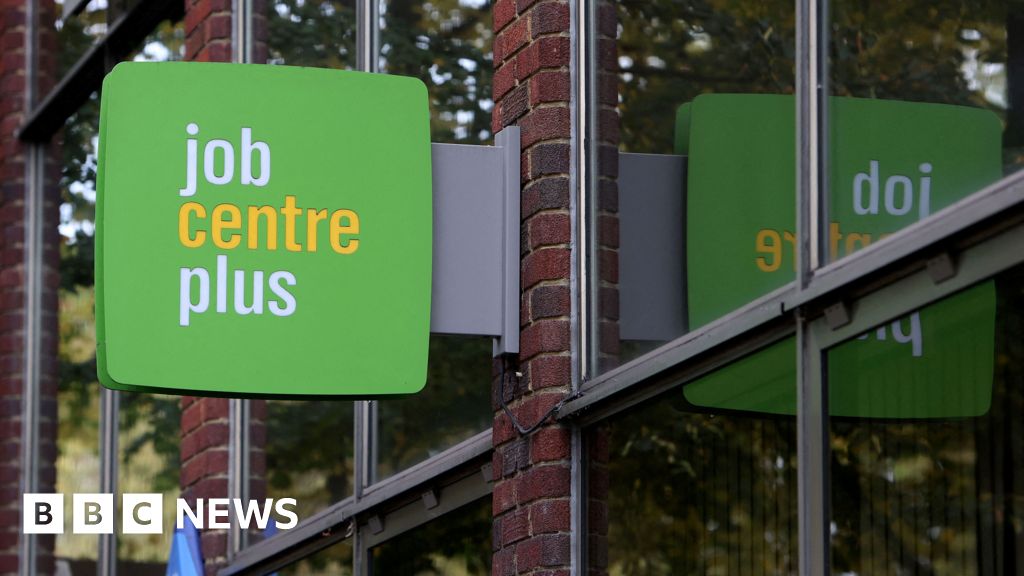
The government says “radical” reform of the system for getting people off sick back into work will help it slash the welfare bill.
Government sources have confirmed Labour is looking to “deliver savings” on the amount is spends on welfare in 30 October’s Budget.
But it says the savings will be delivered through “our own reforms” – rather than Conservative plans.
It comes after reports Chancellor Rachel Reeves is considering sticking with Conservative plans to restrict access to benefits on the grounds of ill-health.
The government has not ruled this out, but is emphasising its own plans to “radically” shake up benefits for people whose health limits their ability to work.
Planned changes – in a draft blueprint entitled Get Britain Working – are expected to be published later this autumn.
Labour wants to make changes to the Work Capability Assessment, which is used to determine if people can receive additional income-related benefits because of a health condition or disability.
It is promising a “proper plan to support disabled people to work”, as well as an as-yet unspecified plan to ensure every young person aged 18 to 21 is either “earning or learning”.
The changes will come alongside Health Secretary Wes Streeting’s plan to send “crack teams” of doctors to hospitals in areas with highest number of people off sick.
It has named Newcastle, Bolton and Blackpool as three cities where doctors will be sent to help people get back into the workforce.
Economic inactivity has spiralled post-pandemic, now affecting 9.3 million people who are neither in work nor looking for a job – a rise of 713,000 since Covid.
One in eight young people are now neither in education nor work.
New statistics show that 1.8 million inactive people – including 600,000 who are long-term sick – want to get back to work.
Kendall called the new figures “a shocking indictment of the inheritance left by the Conservatives and a stain on our nation”.
“The UK continues to be the only major economy whose employment rate hasn’t recovered from the pandemic,” she said.
“We will harness all the skills of the British people to get our country working again and our economy growing again.”
The reforms promise a major overhaul, combining Job Centres with the National Careers Service to offer better support and empowering local leaders to come up with solutions for boosting employment.
In the run up to the Budget, there has been speculation Chancellor Rachel Reeves is considering welfare cuts to help fill a reported £40bn spending gap.
The Work Capability Assessment decides what work-related conditions claimants must meet in order to keep getting benefits in full, and whether they are eligible for top-up payments.
Reeves is reportedly planning to stick with plans announced by her Conservative predecessor Jeremy Hunt to make changes to the test, which the Tories claimed would save an estimated £1.3bn a year by 2028-29.
The government also inherited a public consultation on changing Personal Independence Payments (PIP), a separate payment paid to working-aged people, including those in work, to cover additional health-related costs.
Changes considered by the Tories included replacing monthly cash payments with a vouchers system or one-off grants towards particular costs.
To date, Liz Kendall has not said whether she supports or opposes the thrust of her Tory predecessor’s proposals.
Employment Minister Alison McGovern told Radio 4’s Today programme: “If we do the same as the Tories have done for 14 years, we’ll have the same failure.”
Politics
Faster grid hook-ups planned for some green energy projects

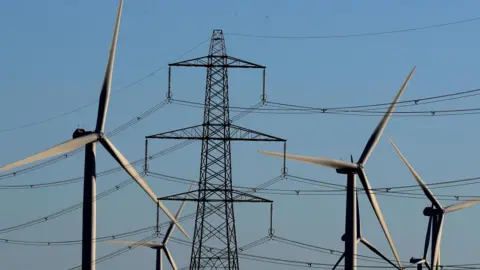 PA
PAWind and solar farms that are ready to be built would be allowed to jump the queue for a connection to the UK’s electricity system under government plans.
All energy schemes which need a connection to the National Grid are currently in a single queue which operates on a “first-come-first-served” basis.
Some projects face waiting times stretching long into the next decade to get connected.
The government wants to speed up projects that will help it meet its goal of decarbonising power generation in the UK by 2030.
Some industry sources say it would be a welcome move but others warn that there is a “real risk” of legal challenges from projects which lose out.
The previous government brought in powers to weed out projects from the queue which were not ready to start, under a “first ready, first connected” system.
It followed complaints that so-called “zombie projects,” which have little or no chance of being built, are blocking the way of those which are ready to go.
Now plans are under way for the creation of what is essentially a new grouping of energy projects, which will run on a “first ready and needed, first connected” system, leapfrogging over other projects in the queue.
The “needed” element refers to projects which are needed for clean power by 2030.
The plans are being developed by the National Energy System Operator (NESO), a new publicly-owned body tasked with connecting generation projects to the grid.
They would need to be approved by the energy regulator Ofgem, with connections intended to start by the end of 2025.
NESO said: “This is a complex challenge, and it’s important we get it right.”
But the industry is calling for more clarity, amid concerns about legal challenges from companies waiting to get connected in the current queue who may find their dates are being pushed back.
Charles Wood, deputy director of Energy UK, said it was “positive” that the government appeared to have acknowledged the threat of legal challenges.
But he said he would like to see more engagement from senior ministers to “address uncertainty” about the plans for network upgrades.
Merlin Hyman, chief executive of energy think tank Regen, said the plans to allow some projects to jump the queue made “a lot of sense” as the current system was “not fit for purpose”.
But he added: “Such a fundamental change is inevitably causing uncertainty for project developers and we need urgently to provide the clarity and certainty needed to unlock investment at the speed and scale required”.
It comes after initial attempts to purge the existing queue for connection of so-called “zombie projects” resulted in only 10 GW of connection being struck off, according to the Energy Networks Association.
This year, Ofgem put the size of the existing queue at 701 GW, and it’s expected to reach 800 GW by the end of 2024, which is far more than the UK would need by 2050.
A Department for Energy Security and Net Zero spokesperson said it planned to submit proposals for reform to Ofgem by the end of the year.
“This includes speeding up the process and reforming the system to remove stalled projects from the queue, so projects which support our 2030 clean power goal can be connected fast,” the spokesperson added.
-

 Science & Environment1 month ago
Science & Environment1 month agoHyperelastic gel is one of the stretchiest materials known to science
-

 Technology3 weeks ago
Technology3 weeks agoIs sharing your smartphone PIN part of a healthy relationship?
-

 Science & Environment1 month ago
Science & Environment1 month ago‘Running of the bulls’ festival crowds move like charged particles
-

 Science & Environment1 month ago
Science & Environment1 month agoMaxwell’s demon charges quantum batteries inside of a quantum computer
-

 Science & Environment1 month ago
Science & Environment1 month agoHow to unsnarl a tangle of threads, according to physics
-

 Technology1 month ago
Technology1 month agoWould-be reality TV contestants ‘not looking real’
-

 Science & Environment1 month ago
Science & Environment1 month agoLiquid crystals could improve quantum communication devices
-

 Science & Environment3 weeks ago
Science & Environment3 weeks agoX-rays reveal half-billion-year-old insect ancestor
-

 Science & Environment1 month ago
Science & Environment1 month agoQuantum ‘supersolid’ matter stirred using magnets
-

 Womens Workouts4 weeks ago
Womens Workouts4 weeks ago3 Day Full Body Women’s Dumbbell Only Workout
-

 Science & Environment1 month ago
Science & Environment1 month agoSunlight-trapping device can generate temperatures over 1000°C
-

 Science & Environment1 month ago
Science & Environment1 month agoWhy this is a golden age for life to thrive across the universe
-

 Science & Environment1 month ago
Science & Environment1 month agoQuantum forces used to automatically assemble tiny device
-

 Science & Environment1 month ago
Science & Environment1 month agoHow to wrap your mind around the real multiverse
-

 Science & Environment1 month ago
Science & Environment1 month agoLaser helps turn an electron into a coil of mass and charge
-

 Science & Environment1 month ago
Science & Environment1 month agoNerve fibres in the brain could generate quantum entanglement
-

 Science & Environment1 month ago
Science & Environment1 month agoITER: Is the world’s biggest fusion experiment dead after new delay to 2035?
-

 Science & Environment1 month ago
Science & Environment1 month agoA slight curve helps rocks make the biggest splash
-

 Science & Environment1 month ago
Science & Environment1 month agoA new kind of experiment at the Large Hadron Collider could unravel quantum reality
-
News1 month ago
the pick of new debut fiction
-

 Science & Environment1 month ago
Science & Environment1 month agoTime travel sci-fi novel is a rip-roaringly good thought experiment
-

 News1 month ago
News1 month ago▶️ Hamas in the West Bank: Rising Support and Deadly Attacks You Might Not Know About
-

 News4 weeks ago
News4 weeks agoOur millionaire neighbour blocks us from using public footpath & screams at us in street.. it’s like living in a WARZONE – WordupNews
-

 News1 month ago
News1 month ago▶️ Media Bias: How They Spin Attack on Hezbollah and Ignore the Reality
-

 Science & Environment1 month ago
Science & Environment1 month agoNuclear fusion experiment overcomes two key operating hurdles
-

 Technology4 weeks ago
Technology4 weeks agoWhy Machines Learn: A clever primer makes sense of what makes AI possible
-

 Technology3 weeks ago
Technology3 weeks agoUkraine is using AI to manage the removal of Russian landmines
-

 Technology2 weeks ago
Technology2 weeks agoThis AI video generator can melt, crush, blow up, or turn anything into cake
-

 Business2 weeks ago
Business2 weeks agoWhen to tip and when not to tip
-

 Science & Environment1 month ago
Science & Environment1 month agoPhysicists have worked out how to melt any material
-

 Science & Environment1 month ago
Science & Environment1 month agoPhysicists are grappling with their own reproducibility crisis
-

 Technology3 weeks ago
Technology3 weeks agoMicrophone made of atom-thick graphene could be used in smartphones
-
Business2 weeks ago
DoJ accuses Donald Trump of ‘private criminal effort’ to overturn 2020 election
-

 TV2 weeks ago
TV2 weeks agoসারাদেশে দিনব্যাপী বৃষ্টির পূর্বাভাস; সমুদ্রবন্দরে ৩ নম্বর সংকেত | Weather Today | Jamuna TV
-

 TV2 weeks ago
TV2 weeks agoLove Island star sparks feud rumours as one Islander is missing from glam girls’ night
-

 Sport2 weeks ago
Sport2 weeks agoWales fall to second loss of WXV against Italy
-

 Sport3 weeks ago
Sport3 weeks agoWorld’s sexiest referee Claudia Romani shows off incredible figure in animal print bikini on South Beach
-

 MMA2 weeks ago
MMA2 weeks agoJulianna Peña trashes Raquel Pennington’s behavior as champ
-

 News2 weeks ago
News2 weeks agoMassive blasts in Beirut after renewed Israeli air strikes
-

 Sport2 weeks ago
Sport2 weeks agoCoco Gauff stages superb comeback to reach China Open final
-
Business3 weeks ago
Eurosceptic Andrej Babiš eyes return to power in Czech Republic
-

 News1 month ago
News1 month agoYou’re a Hypocrite, And So Am I
-

 News2 weeks ago
News2 weeks agoNavigating the News Void: Opportunities for Revitalization
-

 News2 weeks ago
News2 weeks agoHeartbreaking end to search as body of influencer, 27, found after yacht party shipwreck on ‘Devil’s Throat’ coastline
-

 Football2 weeks ago
Football2 weeks agoRangers & Celtic ready for first SWPL derby showdown
-

 News2 weeks ago
News2 weeks ago▶ Hamas Spent $1B on Tunnels Instead of Investing in a Future for Gaza’s People
-

 News2 weeks ago
News2 weeks agoHeavy strikes shake Beirut as Israel expands Lebanon campaign
-

 Sport1 month ago
Sport1 month agoJoshua vs Dubois: Chris Eubank Jr says ‘AJ’ could beat Tyson Fury and any other heavyweight in the world
-

 Science & Environment1 month ago
Science & Environment1 month agoRethinking space and time could let us do away with dark matter
-

 Science & Environment1 month ago
Science & Environment1 month agoCaroline Ellison aims to duck prison sentence for role in FTX collapse
-

 Science & Environment1 month ago
Science & Environment1 month agoA tale of two mysteries: ghostly neutrinos and the proton decay puzzle
-

 Health & fitness1 month ago
Health & fitness1 month agoThe secret to a six pack – and how to keep your washboard abs in 2022
-

 News1 month ago
News1 month agoNew investigation ordered into ‘doorstep murder’ of Alistair Wilson
-
News4 weeks ago
The Project Censored Newsletter – May 2024
-

 Technology3 weeks ago
Technology3 weeks agoQuantum computers may work better when they ignore causality
-

 Sport3 weeks ago
Sport3 weeks agoWatch UFC star deliver ‘one of the most brutal knockouts ever’ that left opponent laid spark out on the canvas
-

 Technology3 weeks ago
Technology3 weeks agoUniversity examiners fail to spot ChatGPT answers in real-world test
-

 Technology2 weeks ago
Technology2 weeks agoTexas is suing TikTok for allegedly violating its new child privacy law
-

 News2 weeks ago
News2 weeks agoHull KR 10-8 Warrington Wolves – Robins reach first Super League Grand Final
-

 MMA2 weeks ago
MMA2 weeks agoDana White’s Contender Series 74 recap, analysis, winner grades
-

 Sport3 weeks ago
Sport3 weeks agoSturm Graz: How Austrians ended Red Bull’s title dominance
-

 Technology2 weeks ago
Technology2 weeks agoSamsung Passkeys will work with Samsung’s smart home devices
-

 Technology2 weeks ago
Technology2 weeks agoA very underrated horror movie sequel is streaming on Max
-

 News2 weeks ago
News2 weeks agoBalancing India and China Is the Challenge for Sri Lanka’s Dissanayake
-

 Servers computers4 weeks ago
Servers computers4 weeks agoWhat are the benefits of Blade servers compared to rack servers?
-

 MMA3 weeks ago
MMA3 weeks agoConor McGregor challenges ‘woeful’ Belal Muhammad, tells Ilia Topuria it’s ‘on sight’
-

 Technology4 weeks ago
Technology4 weeks agoRobo-tuna reveals how foldable fins help the speedy fish manoeuvre
-
Business3 weeks ago
Should London’s tax exiles head for Spain, Italy . . . or Wales?
-

 Technology3 weeks ago
Technology3 weeks ago‘From a toaster to a server’: UK startup promises 5x ‘speed up without changing a line of code’ as it plans to take on Nvidia, AMD in the generative AI battlefield
-

 Football3 weeks ago
Football3 weeks agoFootball Focus: Martin Keown on Liverpool’s Alisson Becker
-

 Technology3 weeks ago
Technology3 weeks agoEpic Games CEO Tim Sweeney renews blast at ‘gatekeeper’ platform owners
-
Business3 weeks ago
Bank of England warns of ‘future stress’ from hedge fund bets against US Treasuries
-

 Business3 weeks ago
Business3 weeks agoChancellor Rachel Reeves says she needs to raise £20bn. How might she do it?
-
Business2 weeks ago
LVMH strikes sponsorship deal with Formula 1
-

 TV2 weeks ago
TV2 weeks agoPhillip Schofield accidentally sets his camp on FIRE after using emergency radio to Channel 5 crew
-

 Technology2 weeks ago
Technology2 weeks agoAmazon’s Ring just doubled the price of its alarm monitoring service for grandfathered customers
-

 Money2 weeks ago
Money2 weeks agoWhy thousands of pensioners WON’T see State Pension rise by full £460 next year
-

 Politics2 weeks ago
Politics2 weeks agoHochul’s careful conversations
-
Politics3 weeks ago
Robert Jenrick vows to cut aid to countries that do not take back refused asylum seekers | Robert Jenrick
-

 Technology2 weeks ago
Technology2 weeks agoMusk faces SEC questions over X takeover
-
Business2 weeks ago
CEOs turn to podcasts to control their message
-

 MMA2 weeks ago
MMA2 weeks agoPereira vs. Rountree prediction: Champ chases legend status
-

 Technology2 weeks ago
Technology2 weeks agoApple iPhone 16 Plus vs Samsung Galaxy S24+
-
Politics2 weeks ago
Rosie Duffield’s savage departure raises difficult questions for Keir Starmer. He’d be foolish to ignore them | Gaby Hinsliff
-

 News2 weeks ago
News2 weeks agoFamily plans to honor hurricane victim using logs from fallen tree that killed him
-

 Technology2 weeks ago
Technology2 weeks agoThe best shows on Max (formerly HBO Max) right now
-

 Sport2 weeks ago
Sport2 weeks agoMan City ask for Premier League season to be DELAYED as Pep Guardiola escalates fixture pile-up row
-

 News1 month ago
News1 month agoIsrael strikes Lebanese targets as Hizbollah chief warns of ‘red lines’ crossed
-

 Technology1 month ago
Technology1 month agoThe ‘superfood’ taking over fields in northern India
-

 Science & Environment1 month ago
Science & Environment1 month agoFuture of fusion: How the UK’s JET reactor paved the way for ITER
-

 Football1 month ago
Football1 month agoMike Williamson: Carlisle United appoint MK Dons boss as head coach
-
Politics4 weeks ago
UK consumer confidence falls sharply amid fears of ‘painful’ budget | Economics
-

 Technology4 weeks ago
Technology4 weeks agoMeta has a major opportunity to win the AI hardware race
-

 Technology3 weeks ago
Technology3 weeks agoArtificial flavours released by cooking aim to improve lab-grown meat
-

 Sport1 month ago
Sport1 month agoUFC Edmonton fight card revealed, including Brandon Moreno vs. Amir Albazi headliner
-

 News1 month ago
News1 month agoHow FedEx CEO Raj Subramaniam Is Adapting to a Post-Pandemic Economy
-

 Science & Environment1 month ago
Science & Environment1 month agoUK spurns European invitation to join ITER nuclear fusion project
-

 CryptoCurrency1 month ago
CryptoCurrency1 month agoCardano founder to meet Argentina president Javier Milei
-

 News4 weeks ago
News4 weeks agoWhy Is Everyone Excited About These Smart Insoles?
-

 Science & Environment4 weeks ago
Science & Environment4 weeks agoMeet the world's first female male model | 7.30


You must be logged in to post a comment Login